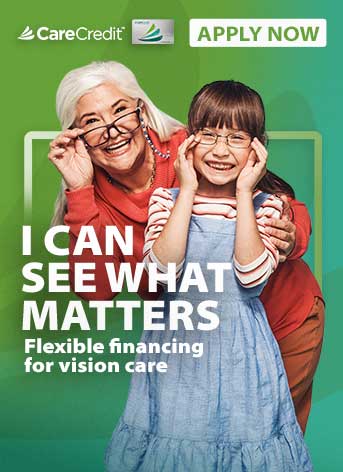Being able to see the world around you through clear and healthy vision is a gift that can be diminished with aging, eye strain and diseases such as corneal disease. Follow these 12 simple tips to protect your vision and help keep your eyes safe and healthy.
1. Avoid the Sun
Wear sunglasses outside, even on overcast days. It's a good idea to wear glasses that provide 100% protection against both Ultraviolet A (UVA) and Ultraviolet B (UVB) rays. In fact, wearing sunglasses that don't provide UV protection can endanger your eyes more because your pupils will dilate and allow in more UV rays. If you're outside often, wear wraparound glasses that protect your eyes from the sides, too.
2. Eat Healthy
Antioxidants like lutein and beta-carotene, along with food high in vitamin C, can reduce your risk of vision problems such as age-related degeneration. You can find these antioxidants in foods like kale, broccoli, carrots and sweet potatoes, and vitamin C in foods like red bell peppers, strawberries and oranges. The omega-3 fatty acids found in salmon, halibut and tuna can also be beneficial.
If you want to make sure you're getting all the right nutrients for your eyes, your eye doctor may be able to make recommendations. For example, a supplement called AREDS can sometimes be helpful for age-related macular degeneration.
3. Avoid Smoking
Smoking can increase your risk of dry eye disease, macular degeneration, optic nerve damage, cataracts and other eye issues. Quit smoking to reduce the risk of developing these eye diseases.
4. Wear Protective Eyewear, Safety Gear or Face Shields
Whether it's safety goggles or a face shield, wear the gear that will best protect you from an eye injury. Many activities can put your eyes at risk — from work-related hazards to doing yard work outside, cooking with sizzling grease or cleaning with chemicals that can splash on you. Outside of work, eye protection is necessary if you're playing any kind of contact sports like martial arts, boxing, racquetball or basketball.
5. Try to Be More Physically Active
Being physically active can lower your risk of developing health problems that can harm your vision, such as high blood pressure or diabetes. Aerobic workouts also increase blood flow to your optic nerve and retina, which can help your eye health. Even just 20 minutes of brisk walking four times a week is beneficial. So do what you can, whether it's stretching while you're watching TV, going for a run, or dancing in the kitchen.
6. Take Frequent Breaks and Get Enough Sleep
Make sure your eyes get the rest they need. This means following the 20-20-20 rule: Glance away from digital screens every 20 minutes and look at an object 20 feet away for 20 seconds.
This also means getting plenty of sleep. Less than five hours a night can cause blurred vision, eye twitches and light sensitivity.
7. Optimize Your Screen
Whether you're sitting at a computer or watching TV, optimize your viewing experience to reduce digital eye strain or Computer Vision Syndrome. Use a computer screen with good contrast and brightness or consider purchasing blue-light-blocking glasses. In the office, your monitor should be at least an arm's length away and close to eye level rather than above your eyes. Avoid glare from direct lighting, and the drying effects of air conditioning and fans.
At home, sit a safe distance from your TV. The minimum recommended distance is five times the width of your television screen.
8. Keep Your Eyes Hydrated
Keep your eyes well hydrated. Many people develop dry eye problems after the age of 50 from medicines such as antihistamines or because of medical conditions like diabetes, or by insufficiently blinking. If you have dry eyes, try using over-the-counter artificial tears or a humidifier at home and drinking more water. For more severe cases, your eye doctor may prescribe special eye drops or other dry eye treatment.
9. Understand Your Family History
Know your family's health history and share it with your eye doctor. Glaucoma and age-related macular degeneration, for example, can have a genetic component. One type of glaucoma — closed-angle — can develop suddenly without warning. If you have a parent or sibling with it, your eye doctor will help you know what to watch for.
10. Wash Your Hands and Don't Rub Your Eyes
Keep your hands clean to prevent the spread of infection and avoid touching your eyes with dirty hands. This is especially important if you wear contact lenses.
Even if your hands are clean, try to avoid rubbing your eyes. Rubbing them can lead to structural damage called keratoconus, which can eventually lead to astigmatism. Rubbing your eyes can also worsen conditions like myopia or glaucoma.
11. Be Careful With Makeup and Moisturizers
Take care when wearing makeup or moisturizers. Never share eye makeup, eye drops or contact lenses. Throw out eye makeup after three months, especially if it's a liquid or cream where bacteria can easily grow. Before you go to sleep, remove your makeup, cleaning your eyelids thoroughly with a mild cleanser and warm water. An over-the-counter scrub for lids and lashes is even better.
If you have any kind of reaction to a new moisturizer or eye makeup, such as redness that won't go away, or pain, see your eye doctor.
12. Get Checkups and Prescriptions
Getting comprehensive dilated eye exams is the best way to check on your eye health. You should have a general eye exam every one to two years (annually if you have any family history of eye disease). Eye exams can even pick up on signs of other health issues, such as diabetes or early-stage colon cancer.
Follow through on any of your eye doctor's recommendations, including prescription eyeglasses or contact lenses. You'll need yearly exams to make sure your prescriptions are updated to match any vision changes. If you don't use daily wear disposable contacts, make sure to clean your contact lenses every night according to your doctor's advice.
Don't hesitate to make an extra appointment if you notice anything unusual. If your eyes become red or pink, if you start seeing flashes or shimmers in your vision or if you notice any other vision changes, contact your eye doctor right away.
Many Eye Problems Are Within Your Control
The bottom line is that many common vision problems are within your control to some degree. The most frequent eye problems in the U.S. are refractive issues that prescription lenses can improve. Cataracts, diabetes and glaucoma are leading causes of blindness, which eye doctors can also help treat if caught early.
Taking your eye health seriously can prevent major problems down the line. While there are some things you can't change, such as aging, there are plenty of other factors affecting your vision that you can control. If you start taking protective steps now, you'll reap the benefits in the years ahead.
Financing Eye Exams With the CareCredit Credit Card
Regular eye exams are an important part of your eye health. Whether you're getting an eye exam or paying for eye surgery, the CareCredit credit card can help you pay for care where your insurance leaves off.* Use our Acceptance Locator to find a vision specialist near you that accepts CareCredit. Continue your wellness journey by downloading the CareCredit Mobile App to manage your account, find a provider on the go and easily access the Well U blog for more great articles, podcasts and videos.
In addition to vision care, you can also use your CareCredit credit card for dentistry, cosmetic, pet care, hearing, health systems, dermatology, pharmacy purchases, spa treatments and so much more within the CareCredit network. How will you invest in your health and wellness next?
Expert Reviewer
Dr. Alexandra Chebil, M.D., F.R.C.S.C.
Dr. Alexandra Chebil is a board-certified ophthalmologist with the Lasik Center Medical Group in Newport Beach, California, who has more than 25 years of experience with refractive surgery and noninvasive facial aesthetic procedures. She was one of the first ophthalmologists to perform LASIK, and has successfully performed more than 70,000 procedures.
Author Bio
Stephanie Dwilson specializes in science journalism, breaking news and animal health and is a business owner, non-practicing attorney and writer.








